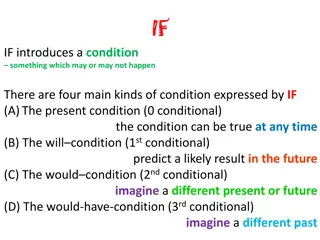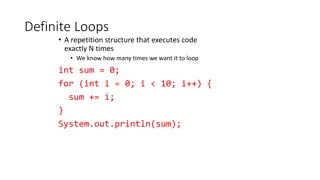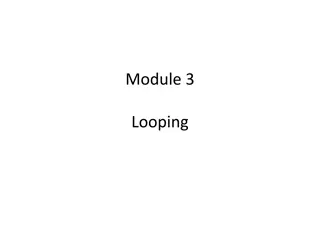
Java Conditionals and Loops Explained
Learn about Java if statements, else if, else, nested if statements, match statements, and the importance of breaks in switch cases. Understand how conditionals work in Java and compare them with Python. Dive into examples and explore the syntax differences between the two languages.
Download Presentation

Please find below an Image/Link to download the presentation.
The content on the website is provided AS IS for your information and personal use only. It may not be sold, licensed, or shared on other websites without obtaining consent from the author. If you encounter any issues during the download, it is possible that the publisher has removed the file from their server.
You are allowed to download the files provided on this website for personal or commercial use, subject to the condition that they are used lawfully. All files are the property of their respective owners.
The content on the website is provided AS IS for your information and personal use only. It may not be sold, licensed, or shared on other websites without obtaining consent from the author.
E N D
Presentation Transcript
Module 1 Part 2 Conditionals and Loops
If statements in Java They work the same as if statements in Python. You don t put a : after the if, or else statement, instead you use {} s after each part. elif in Python is else if in Java Each conditional must evaluate to a boolean value. if(x>3) The conditional must have () s around it. if statements can have: Unlimited else if statements Optional else statements
Conditionals Java import java.util.Scanner; public class Main { public static void main(String[] args) { Scanner myScan=new Scanner(System.in); System.out.println("What is your age?"); int age=myScan.nextInt(); if(age<18) { System.out.println("You cannot drink or vote"); } else if(age<21) { System.out.println("You can vote but not drink"); } else { System.out.println("You can vote and drink, don't do them together"); } } }
and, or, not &&, ||, ! Python Java if x<20 and y>5: print("Yes") if((x<20) && (y>5)) { print( Yes ); } if x<20 or y>5: print( Yes ) if((x<20) || (y>5)) { print( Yes ); } if 5 < x < y: print("Yes") if((5<x) && (x<y)) { print( Yes ); } if not a<b: print( No ) if(! (a<b)) { print( No ); }
if-elif-else Python Java
Nested If Statements Python Java if weather=="Sunny": if temperature<=70: print("Wear a hoodie") else: print("Wear a tee-shirt") else: print("Bring an umbrella") if(weather.equals("Sunny")) { if (temperature <= 70) { System.out.println("Wear a hoodie"); } else { System.out.println("Wear a tee-shirt"); } } else { System.out.println("Bring an umbrella") }
Match Statements Python Java match choice: case 1: print("Hello") case 2: print("Goodbye") case _: print("Unknown") switch(choice) { case 1: System.out.println("Hello"); break; case 2: System.out.println("Goodbye"); break; default: System.out.println("unknown"); }
In java each case must have a break If you forget the break, it may execute multiple statements. This is absolutely a feature certainly not a bug :)
A new shortcut in Java In python if you had a variable called x, and you wanted to increase its value by 1, you had 2 choices: x=x+1 x+=1 Java gives you an additional choice: x++; If you wish to decrease the value by 1 there is: x--; All three syntax are accepted in java
Java Loops Python has a while loop and a for loop. Java has a while loop, do loop, for loop and foreach loop. The while loop works the same in both languages. The for loop in Python is the same as a foreach loop in Java. Python has no equivalent of a do or for loop.
Java while loop int x=10; while(x>0) { System.out.println("x is "+x); x-=1; } Output: x is 10 x is 9 x is 8 x is 7 x is 6 x is 5 x is 4 x is 3 x is 2 x is 1
Java do loop A do loop works the same as a while loop, but the condition is only checked at the end of the loop. This ensures the loop happens at least once. A while loop can happen 0 times. e.g. x=5 while(x>10) { System.out.println(x); } A do loop is written with the word do at the top, and while at the bottom. While is always followed by () s
Example of do while loop Scanner myScan=new Scanner(System.in); //Ensure they enter a name with at least 3 characters: String name=""; do { System.out.println("Enter your name"); name=myScan.nextLine(); }while(name.length()<3);
dowhile loops final thoughts do while loops are used when you want to do something at least once. The last example is a common use for do while loops, where you are going to have to ask for the name at least once. It s always possible to convert a do while loop into a while loop. For example you could set name to something which is longer than 3 characters to start with, then use while but that s a little clunky.
Foreach loops in Java Work the same as for loops in python. You must be looping over a collection of things: e.g. array, arraylist, etc. Note: Strings are not iterable We don t use foreach loops in java when we want to count. i.e. for x in range(10): in python would not use a foreach loop in java. It ll use a for loop which we ll show you soon.
For loop (Python), Foreach loops (Java): Python Java password="fluffyBunny123" String password = "fluffyBunny123"; hasNumber=False #Check it has at least 1 number for x in password: if x.isdigit(): hasNumber=True boolean hasNumber = false; //Check it has at least 1 number for (char x : password.toCharArray()) { if (Character.isDigit(x)) { hasNumber = true; } } if not hasNumber: print("Invalid password") if (! hasNumber) { System.out.println("Invalid password"); }
for loop in java Used when you want a loop that happens a set number of times. Syntax has 3 parts: Declare and initialize a variable Conditional check that determines if we keep going Something which changes the variable Each part is separated by semicolons (;)
Example for loop for(int i=0;i<10;i++) { System.out.println(i); } This created a variable called i. This variable only exists inside this loop. i is initially set to 0. We now check if i is less than 10. Since 0 is less than 10 we ll print 0. Next we ll change the value of i by 1 (i++) We again check the condition of i being less than 10, which it is, so we continue.
Other examples of for loop for(char x= a ,x< z ,x++) { System.out.println(x); } //This prints abcdefghijklmnopqrstuvwxy for(int y=100;y>0;y--) { System.out.println(y+ , ); } //This prints 100,99,98 1,
for vs foreach in java. Notice that both for and foreach use the same keyword: for(int i=0;i<10;i++) for(char x : name) They both use the for keyword, but the syntax inside the parentheses are different. If you are counting, it ll have 2 semicolons If you are iterating over a collection, it ll have a single colon.
Break Sometimes you want a loop to finish suddenly. Just like in Python, the command is break Break will immediately end the loop, and continue with the first statement after the loop.
Continue In python and java if you want to skip an iteration of a loop you can use continue. When it encounters continue, the loop starts the next iteration immediately. Can be useful when searching for something.
Class Exercise Write a program that asks the user for an initial investment amount (double), an interest rate (double), and a number of years (int). Using an appropriate loop calculate the ending balance.
Solution: double currentBalance=100; double interestRate=3.4; int years=10; for(int i=1;i<=years;i++) { currentBalance+=(currentBalance*(interestRate/100)); System.out.println("After year "+i+" balance is $"+currentBalance); } System.out.println("Ending Balance: "+currentBalance);






















